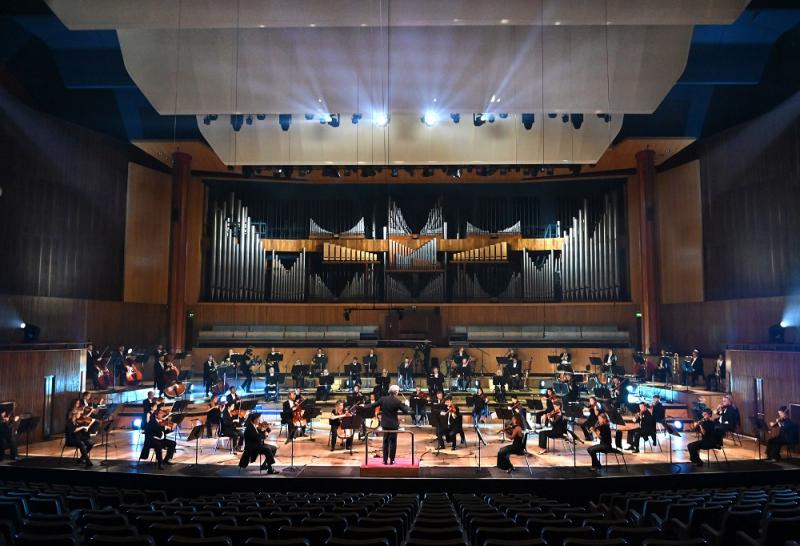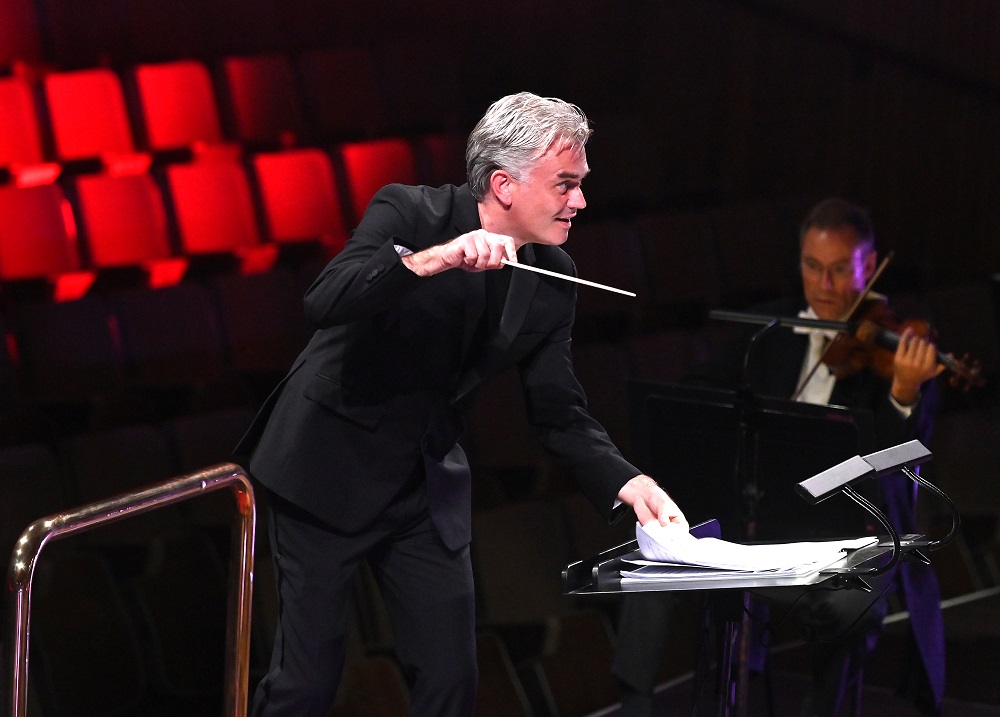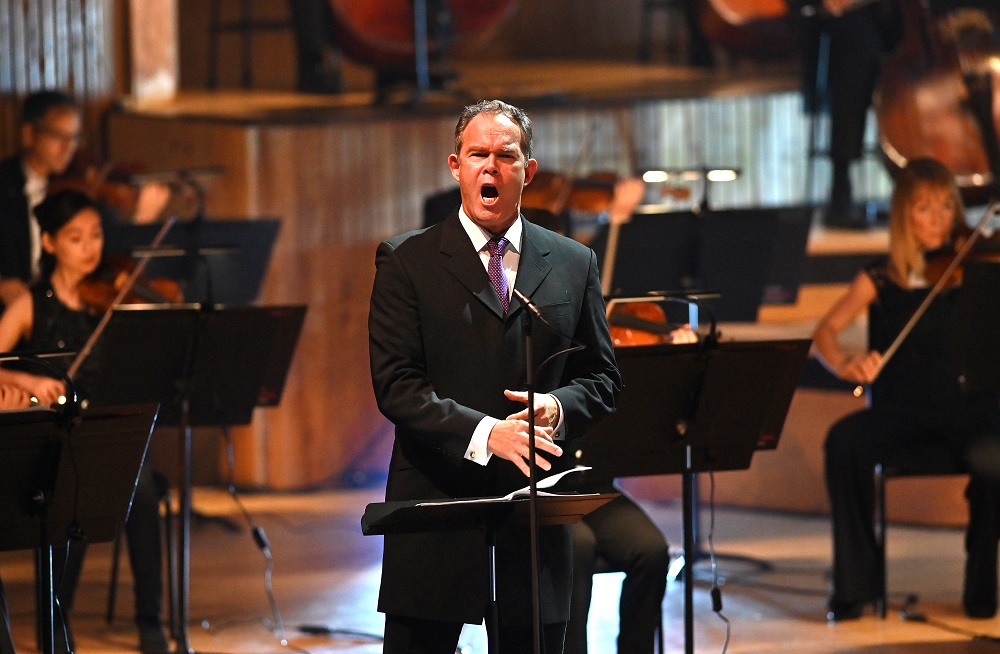Finley, LPO, Gardner, Royal Festival Hall (p)review - special magic ready for streaming | reviews, news & interviews
Finley, LPO, Gardner, Royal Festival Hall (p)review - special magic ready for streaming
Finley, LPO, Gardner, Royal Festival Hall (p)review - special magic ready for streaming
A privileged glimpse of a great orchestra in full flight back in a much-loved venue

There was a rainbow over the Royal Festival Hall as I crossed one of the Hungerford foot bridges for the first time in six months. The lights and noises inside did not betray the augury. Was it the sheer hallucinatory pleasure of being within the auditorium with a handful of other spectators watching and hearing a full orchestra after what felt like a lifetime?
Those just floated and soared from the London Philharmonic Orchestra under its Principal Conductor Designate Edward Gardner. (pictured below) The mighty Fifth was the last work to be heard in the hall before lockdown, in Esa-Pekka Salonen's Philharmonia reconstruction of the epic 1808 concert Beethoven presented in Vienna (I still can't regret being at the Barbican that same evening, 15 March, witnessing "the rest is silence" in the dying-out "Epilogo" of Vaughan Williams's Sixth Symphony from the London Symphony Orchestra and Antonio Pappano).  This was an exceptional programme, too: no grey or elegiac start of the kind we’ve become rather used to hearing in these times but the Beethovenian jest of Widmann’s Con brio, razor sharp in its burps and lunges, and a rare chance to hear Einojuhani Rautavaara’s haunting and often counter-intuitive arrangements of Sibelius songs, made especially for the baritone Gerald Finley and recorded by him shortly after Rautavaara’s death with Gardner and his other orchestra, the Bergen Philharmonic (together they gave the premiere in 2014).
This was an exceptional programme, too: no grey or elegiac start of the kind we’ve become rather used to hearing in these times but the Beethovenian jest of Widmann’s Con brio, razor sharp in its burps and lunges, and a rare chance to hear Einojuhani Rautavaara’s haunting and often counter-intuitive arrangements of Sibelius songs, made especially for the baritone Gerald Finley and recorded by him shortly after Rautavaara’s death with Gardner and his other orchestra, the Bergen Philharmonic (together they gave the premiere in 2014).
The orchestra sometimes tugs against the singer, it would seem deliberately, but the colourings are idiomatic Sibelius, especially clarinets in octaves. The deepest, darkest of the selected songs, “The tree,” found Finley (pictured below) on top form at the plangent higher extreme of the register as the storm-ravaged sentinel yearning for death, capped by a brooding orchestral postlude: the territory of the Fourth Symphony, which followed the Op. 57 set of songs from which Rautavaara chose two for his selection. Only the last of his choices, "Black Roses", would be familiar to most listeners, and in many ways it's the most conventional of the sequence - though only by Sibelius's extraordinary standards.  What more to say about the Beethoven? No tricks, just perfect continuity and seemingly “right” tempi, which may have been why the tricky Andante con moto seemed to flow like a river without rocks in the middle, never outstaying its welcome as it often does. Gardner stage-managed pianissimos and crescendos to perfection, and the finale felt like sheer elevated joy, not hard-hitting insistence on victory. No doubt the players felt the freshness of revisiting a familiar work after so long a parting from each other. The lighting for the film – you can watch it from 30 September – transfigured the hall, with those futuristic boxes glowing neonist-white, and the empty front stalls – four critics and a handful of patrons were admitted from row BB back – added to the supernatural quality of the experience. It should be even better when a proper socially-distanced audience is readmitted, but until the end of this year, at least, that doesn't look possible. The Barbican, on the other hand, has plans to open up - watch this space.
What more to say about the Beethoven? No tricks, just perfect continuity and seemingly “right” tempi, which may have been why the tricky Andante con moto seemed to flow like a river without rocks in the middle, never outstaying its welcome as it often does. Gardner stage-managed pianissimos and crescendos to perfection, and the finale felt like sheer elevated joy, not hard-hitting insistence on victory. No doubt the players felt the freshness of revisiting a familiar work after so long a parting from each other. The lighting for the film – you can watch it from 30 September – transfigured the hall, with those futuristic boxes glowing neonist-white, and the empty front stalls – four critics and a handful of patrons were admitted from row BB back – added to the supernatural quality of the experience. It should be even better when a proper socially-distanced audience is readmitted, but until the end of this year, at least, that doesn't look possible. The Barbican, on the other hand, has plans to open up - watch this space.
rating
Explore topics
Share this article
The future of Arts Journalism
You can stop theartsdesk.com closing!
We urgently need financing to survive. Our fundraising drive has thus far raised £49,000 but we need to reach £100,000 or we will be forced to close. Please contribute here: https://gofund.me/c3f6033d
And if you can forward this information to anyone who might assist, we’d be grateful.

Subscribe to theartsdesk.com
Thank you for continuing to read our work on theartsdesk.com. For unlimited access to every article in its entirety, including our archive of more than 15,000 pieces, we're asking for £5 per month or £40 per year. We feel it's a very good deal, and hope you do too.
To take a subscription now simply click here.
And if you're looking for that extra gift for a friend or family member, why not treat them to a theartsdesk.com gift subscription?
more Classical music
 From Historical to Hip-Hop, Classically Black Music Festival, Kings Place review - a cluster of impressive stars for the future
From quasi-Mozartian elegance to the gritty humour of a kitchen inspection
From Historical to Hip-Hop, Classically Black Music Festival, Kings Place review - a cluster of impressive stars for the future
From quasi-Mozartian elegance to the gritty humour of a kitchen inspection
 Shibe, LSO, Adès, Barbican review - gaudy and glorious new music alongside serene Sibelius
Adès’s passion makes persuasive case for the music he loves, both new and old
Shibe, LSO, Adès, Barbican review - gaudy and glorious new music alongside serene Sibelius
Adès’s passion makes persuasive case for the music he loves, both new and old
 Anja Mittermüller, Richard Fu, Wigmore Hall review - a glorious hall debut
The Austrian mezzo shines - at the age of 22
Anja Mittermüller, Richard Fu, Wigmore Hall review - a glorious hall debut
The Austrian mezzo shines - at the age of 22
 First Person: clarinettist Oliver Pashley on the new horizons of The Hermes Experiment's latest album
Compositions by members of this unusual quartet feature for the first time
First Person: clarinettist Oliver Pashley on the new horizons of The Hermes Experiment's latest album
Compositions by members of this unusual quartet feature for the first time
 Gesualdo Passione, Les Arts Florissants, Amala Dior Company, Barbican review - inspired collaboration excavates the music's humanity
At times it was like watching an anarchic religious procession
Gesualdo Passione, Les Arts Florissants, Amala Dior Company, Barbican review - inspired collaboration excavates the music's humanity
At times it was like watching an anarchic religious procession
 Classical CDs: Camels, concrete and cabaret
An influential American composer's 90th birthday box, plus British piano concertos and a father-and-son duo
Classical CDs: Camels, concrete and cabaret
An influential American composer's 90th birthday box, plus British piano concertos and a father-and-son duo
 Cockerham, Manchester Camerata, Sheen, Martin Harris Centre, Manchester review - re-enacting the dawn of modernism
Two UK premieres added to three miniatures from a seminal event of January 1914
Cockerham, Manchester Camerata, Sheen, Martin Harris Centre, Manchester review - re-enacting the dawn of modernism
Two UK premieres added to three miniatures from a seminal event of January 1914
 Kempf, Brno Philharmonic, Davies, Bridgewater Hall, Manchester review - European tradition meets American jazz
Bouncing Czechs enjoy their Gershwin and Brubeck alongside Janáček and Dvořák
Kempf, Brno Philharmonic, Davies, Bridgewater Hall, Manchester review - European tradition meets American jazz
Bouncing Czechs enjoy their Gershwin and Brubeck alongside Janáček and Dvořák
 Solomon, OAE, Butt, QEH review - daft Biblical whitewashing with great choruses
Even a top soprano and mezzo can’t make this Handel paean wholly convincing
Solomon, OAE, Butt, QEH review - daft Biblical whitewashing with great choruses
Even a top soprano and mezzo can’t make this Handel paean wholly convincing
 Two-Piano Gala, Kings Place review - shining constellations
London Piano Festival curators and illustrious friends entertain and enlighten
Two-Piano Gala, Kings Place review - shining constellations
London Piano Festival curators and illustrious friends entertain and enlighten
 Echo Vocal Ensemble, Latto, Union Chapel review - eclectic choral programme garlanded with dance
Beautiful singing at the heart of an imaginative and stylistically varied concert
Echo Vocal Ensemble, Latto, Union Chapel review - eclectic choral programme garlanded with dance
Beautiful singing at the heart of an imaginative and stylistically varied concert
 Scott, Irish Baroque Orchestra, Whelan, RIAM, Dublin review - towards a Mozart masterpiece
Characteristic joy and enlightenment from this team, but a valveless horn brings problems
Scott, Irish Baroque Orchestra, Whelan, RIAM, Dublin review - towards a Mozart masterpiece
Characteristic joy and enlightenment from this team, but a valveless horn brings problems

Add comment